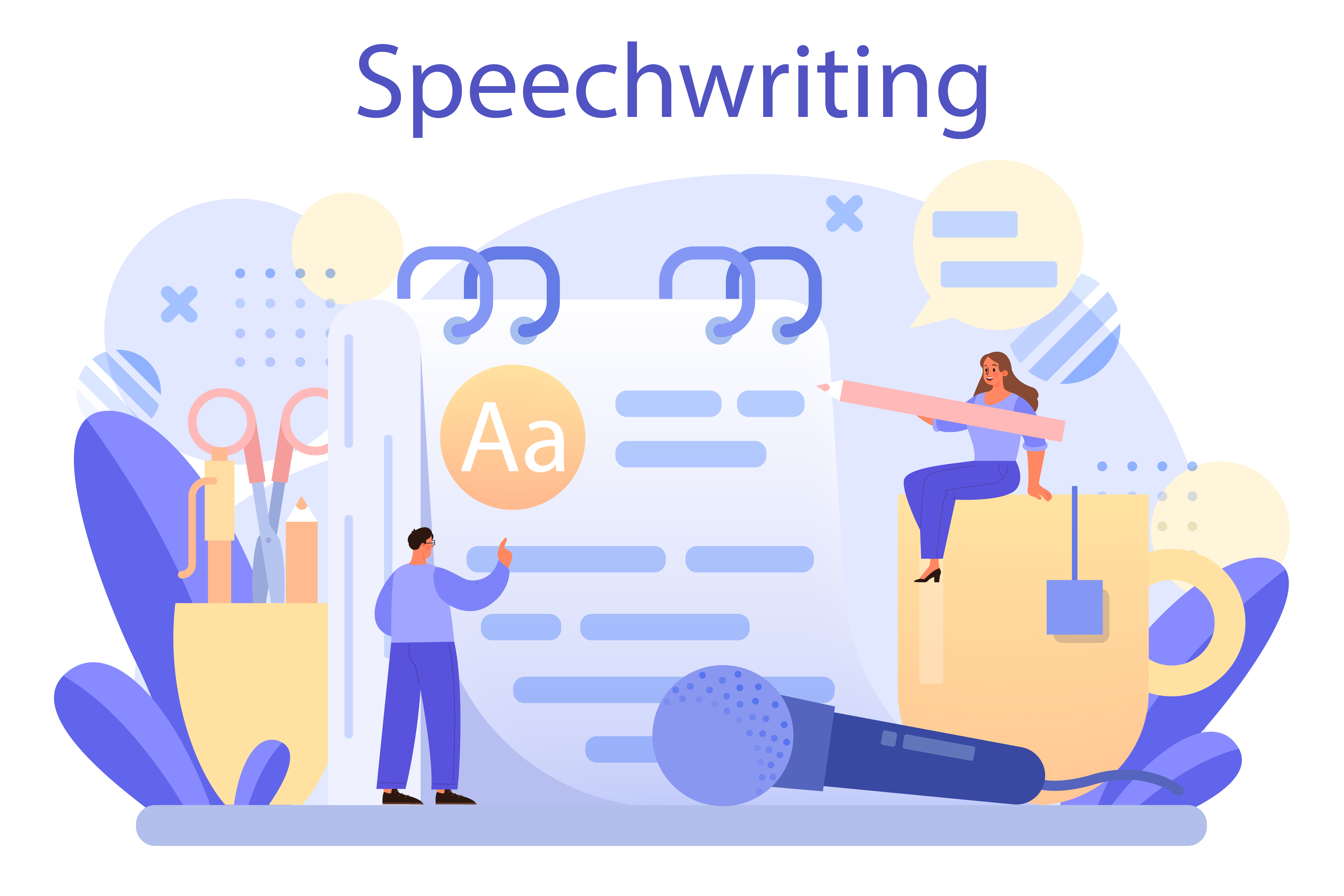Unlocking the Secrets of Great Speechwriters: Lessons from History's Best Orators

There's no denying the power of a great speech. It can move us to tears, inspire us to action, and bring about real change. But behind every great speech is a skilled speechwriter who knows how to craft words in a way that resonates with the audience. In this blog post, we'll explore the secrets of great speechwriters by taking lessons from history's most notable orators.
Understand Your Audience
Understanding your audience is a crucial aspect of great speechwriting. A great speech should be tailored to the specific needs and interests of your audience, as well as their level of knowledge and familiarity with the topic.
One of the best examples of a speaker who understood his audience was Winston Churchill. During World War II, Churchill delivered numerous speeches to rally the British people and boost their morale. He understood that his audience was facing a difficult and uncertain time, and he used his speeches to inspire them and give them hope.
In his famous "We Shall Fight on the Beaches" speech, Churchill spoke directly to his audience, using powerful and emotive language to rally them behind the war effort. He said, "We shall defend our Island, whatever the cost may be, we shall fight on the beaches, we shall fight on the landing grounds, we shall fight in the fields and in the streets, we shall fight in the hills; we shall never surrender."
By understanding the needs and concerns of his audience, Churchill was able to deliver a speech that resonated with them and inspired them to keep fighting.
To understand your audience, it's important to do your research. Find out as much as you can about your audience's demographics, interests, and knowledge level. This will help you to tailor your speech to their specific needs and interests.
It's also important to consider the context in which you will be delivering your speech. Will it be a formal or informal setting? What is the purpose of the speech? Answering these questions will help you to determine the tone and style of your speech.
Finally, be sure to engage with your audience during your speech. Ask questions, encourage participation, and respond to feedback. This will help to create a connection between you and your audience, and make your speech more memorable and impactful.
Use Metaphors and Analogies

Using metaphors and analogies can be a powerful tool for speechwriters. They can help to simplify complex ideas, make abstract concepts more concrete, and create a memorable image in the minds of your audience.
One of the most famous speeches to use metaphors and analogies is Martin Luther King Jr.'s "I Have a Dream" speech. In this speech, King used powerful metaphors to create a vision of a better future for his audience. For example, he said, "We will not be satisfied until justice rolls down like waters and righteousness like a mighty stream."
By comparing justice and righteousness to powerful natural forces like water and a mighty stream, King was able to create a vivid image in the minds of his audience and make his message more memorable.
Another great example of using metaphors and analogies in a speech is Steve Jobs' commencement address at Stanford University in 2005. In this speech, Jobs used the analogy of connecting the dots to explain how his experiences and failures led him to success. He said, "You can't connect the dots looking forward; you can only connect them looking backwards. So you have to trust that the dots will somehow connect in your future."
By using this analogy, Jobs was able to explain a complex idea in a simple and relatable way, making his message more accessible and memorable.
When using metaphors and analogies in a speech, it's important to choose ones that are relevant to your audience and easy to understand. Avoid using obscure or overly complicated metaphors, as they can confuse and alienate your audience.
It's also important to use metaphors and analogies sparingly. Too many can detract from your message and make your speech seem forced or contrived. Use them strategically to illustrate your point and create a lasting impression on your audience.
Use Rhetorical Devices
Rhetorical devices are techniques used by speechwriters to create an impact on the audience. These devices can be used to add emphasis, create a sense of urgency, or make a point more memorable. By incorporating rhetorical devices into your speech, you can create a more engaging and persuasive argument.
One of the most common rhetorical devices used in speeches is repetition. This involves repeating a word, phrase, or sentence for emphasis. A classic example of this is Martin Luther King Jr.'s "I Have a Dream" speech, in which he repeated the phrase "I have a dream" throughout the speech. This repetition helped to create a sense of urgency and emphasized the importance of his message.
Another effective rhetorical device is the use of rhetorical questions. These are questions that are asked for effect rather than to elicit a response. Rhetorical questions can be used to challenge the audience's beliefs or to create a sense of curiosity. For example, in his famous speech "The Gettysburg Address," Abraham Lincoln used rhetorical questions to emphasize the importance of the sacrifices made by the soldiers in the Civil War.
Metaphors and similes are also commonly used rhetorical devices in speeches. These devices compare one thing to another to create a vivid image in the audience's mind. For example, in her speech at the 2016 Democratic National Convention, Michelle Obama used a metaphor to describe the importance of leadership. She said, "I wake up every morning in a house that was built by slaves, and I watch my daughters, two beautiful, intelligent black young women, playing with their dogs on the White House lawn."
Finally, alliteration is a popular rhetorical device in speeches. This involves the repetition of the same sound or letter at the beginning of adjacent or closely connected words. For example, in his inaugural address, John F. Kennedy used alliteration to emphasize his message of unity. He said, "Let us not seek the Republican answer or the Democratic answer, but the right answer. Let us not seek to fix the blame for the past. Let us accept our own responsibility for the future."
Tell a Story
One of the most powerful ways to connect with an audience and make a message more memorable is to tell a story. Stories are a fundamental part of human communication and have been used throughout history to convey important messages and values.
In a speech, a story can help to illustrate a point, add emotional depth, and create a sense of empathy with the audience. For example, if you are giving a speech about the importance of education, you could share a personal story about how education has impacted your life or the life of someone you know.
The key to telling a compelling story is to make it relatable and engaging. This can be done by using vivid details, dialogue, and a clear narrative structure. It's important to keep the story concise and to the point, as a long-winded or convoluted story can lose the attention of the audience.
In addition to personal stories, historical or fictional stories can also be effective in a speech. For example, in his famous "I Have a Dream" speech, Martin Luther King Jr. referenced the story of the Emancipation Proclamation and the Declaration of Independence to emphasize the importance of equality and justice.
When telling a story in a speech, it's important to practice and rehearse to ensure that it flows smoothly and effectively. It's also important to consider the context and audience of the speech, and to choose a story that will resonate with them.
Use Humor

Using humor in a speech can be a great way to connect with an audience and make a message more engaging and memorable. When used effectively, humor can help to break the ice, alleviate tension, and make a speaker seem more approachable and relatable.
However, it's important to use humor judiciously and appropriately. Humor that is offensive, insensitive, or inappropriate can backfire and alienate an audience. It's also important to consider the context and audience of the speech, and to choose humor that will resonate with them.
One effective way to use humor in a speech is to tell a relevant and relatable joke or anecdote. For example, if you're giving a speech about the challenges of parenting, you could tell a funny story about your own experiences as a parent. This can help to put the audience at ease and make the message more relatable.
Another effective way to use humor is to use irony or sarcasm to make a point. This can be a more subtle way to use humor and can be particularly effective when the audience is already familiar with the topic or issue being discussed.
It's also important to remember that humor should never come at the expense of the message or the audience. Humor should be used as a tool to enhance the message and make it more engaging, not to distract from it.
Use Emotion
Using emotion in a speech can be a powerful way to connect with an audience and make a message more impactful and memorable. Emotions such as empathy, passion, and inspiration can help to create a sense of shared experience and encourage the audience to take action.
One effective way to use emotion in a speech is to share personal stories or experiences that relate to the message. This can help to create empathy and make the message more relatable. For example, if you're giving a speech about the importance of mental health, you could share a personal story about your own struggles with mental health.
Another way to use emotion in a speech is to use vivid language and imagery to create a strong emotional response. For example, instead of saying "the company has had some setbacks", you could say "the company has been hit by a series of devastating blows". This can help to create a sense of urgency and emotion around the message.
It's also important to consider the tone and delivery of the speech when using emotion. A speaker who is passionate and enthusiastic about the message can help to inspire and motivate the audience. However, it's important to strike a balance and avoid coming across as overly emotional or melodramatic.
When using emotion in a speech, it's important to be authentic and sincere. Emotions that are forced or insincere can be off-putting to an audience. It's also important to consider the context and audience of the speech, and to use emotion that will resonate with them.
Practice, Practice, Practice
One of the most important aspects of delivering a great speech is practice. No matter how well-written a speech is, it's the delivery that really brings it to life and makes it memorable for the audience.
The first step in practicing a speech is to read it through several times and become familiar with the content. Once the content is familiar, it's important to start practicing the delivery. This involves practicing the tone, pace, and emphasis of each part of the speech.
One effective way to practice a speech is to record it and listen back to it. This can help to identify areas that need improvement, such as sections that are too fast or too slow, or parts that lack emphasis. It's also important to practice in front of a mirror or with a trusted friend or colleague who can provide feedback and help to identify areas for improvement.
Another important aspect of practicing a speech is timing. It's important to ensure that the speech is within the allotted time and that each section of the speech is given enough time to make an impact. Practicing the timing of the speech can help to ensure that it flows well and is engaging for the audience.
Finally, it's important to practice the speech in the context in which it will be delivered. This means practicing in the same room or space where the speech will be given, and with the same equipment, such as microphones and podiums. This can help to ensure that there are no unexpected surprises on the day of the speech and that the speaker is comfortable with the space and equipment.
As you can see, great speechwriters understand the importance of understanding their audience, using metaphors and analogies, using rhetorical devices, telling a story, using humor and emotion, and practicing rigorously. By taking lessons from history's most notable orators, we can unlock the secrets of great speechwriting and create speeches that inspire change and captivate audiences. Whether you're delivering a keynote address, a wedding speech, or a political campaign speech, these techniques and strategies can help you to deliver a powerful message with confidence and clarity.
--------------------------------------
ZapMyWork.com is your one-stop shop for all your freelance needs. We are an online marketplace that connects clients with skilled and talented freelancers from around the world. One of the things that sets us apart from other freelance marketplaces is our rigorous screening process. We carefully vet all of our freelancers to ensure that they have the skills and experience to deliver high-quality work, one project at a time. Let us know how we can help you today!
Recent Posts
-
04/26/2024Thriving Through Flexibility: How FlexiConsulting Found Success with ZapMyWork
-
04/19/2024Flourishing Home Trends: How "ZapMyWork" Became the Cornerstone of Our Interior Design Success
-
04/15/2024Weaving Success with ZapMyWork's Freelance Marketplace
-
04/12/2024Streamlining Project Management in Small Businesses: The ZapMyWork Experience with ClearVision Consulting
-
04/10/2024Transforming Toy Design with Electronics Engineering Freelancers: A Case Study on ToyInnovate
Store Address
Information
Copyright © 2022 - Present. ZapMyWork, LLC. All Rights Reserved




